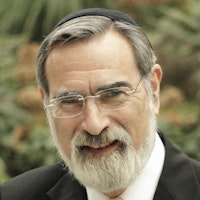I sum up the Jewish imperative, very simply―and it has been like this since the days of Abraham: to be true to your faith is a blessing to others regardless of their faith.
Jonathan Sacks

A Blessing to Others
Topic: Interfaith Pathways
By being what only I can be, I give humanity what only I can give. It is my uniqueness that allows me to contribute something unique to the universal heritage of humankind. I sum up the Jewish imperative, very simply―and it has been like this since the days of Abraham: to be true to your faith is a blessing to others regardless of their faith. That’s the big paradox when you really reach the very depth of particularity.
Jonathan Henry Sacks, Baron Sacks, was born on March 8, 1948, in Lambeth, London. He became a notable British Orthodox rabbi, philosopher, theologian, author, and politician. From 1991 to 2013, he served as the Chief Rabbi of the United Hebrew Congregations of the Commonwealth, playing a pivotal role in guiding and representing Jewish communities across the region.
Beyond his leadership in the Jewish community, Sacks was deeply passionate about character education, morality, and the importance of family. He frequently emphasized the role of ethical teachings in forming well-rounded individuals and believed in the necessity of strong family bonds for a stable society. An accomplished author, his books often explored the intersections of faith, morality, and contemporary challenges, aiming to make religious insights relevant to a wide audience. These works not only resonated within religious circles but also found acclaim in academic and political spheres due to their timely and profound insights.
Sacks passed away on November 7, 2020, in London. His legacy, marked by interfaith dialogue, advocacy for character education, and a steadfast commitment to the Jewish community, continues to inspire many. He is survived by his wife, Elaine Taylor Sacks, whom he married in 1970.
Enriched by Difference
Tippett, Krista. Becoming Wise: an Inquiry into the Mystery and Art of Living. Penguin Books, 2017. Pages 188-190.

Jonathan Sacks
Theme: Interfaith Dialogue

About This Jonathan Sacks Quotation [Commentary]
Lord Jonathan Sacks expresses a timeless principle in his statement: “to be true to your faith is a blessing to others regardless of their faith.” He emphasizes that the Jewish imperative, rooted in Abraham’s teachings, calls for a form of religious fidelity that benefits the wider community. For Sacks, being authentic to one’s spiritual heritage not only enriches the individual but also contributes positively to the lives of those from different faiths, creating a shared sense of blessing.
In the context of interfaith dialogue, Sacks challenges the idea that religious particularity leads to division. Instead, he argues that the depth of one’s religious commitment can enhance understanding and appreciation of others’ beliefs. The uniqueness of each faith tradition, he suggests, is not a barrier but a source of universal enrichment. By embracing these differences, we add something valuable to the collective spiritual heritage of humanity, fostering a spirit of openness in interfaith interactions.
Sacks also cautions against limiting our understanding of God to any single religious framework. He reminds us that God’s presence can be found in unexpected places and through people of various faiths. This perspective encourages believers to recognize the sacred in all traditions, understanding that true spirituality is inclusive rather than exclusive. Sacks advocates for a religious life that, while deeply rooted in its own tradition, serves as a blessing to all, promoting mutual respect and a shared sense of purpose across different faiths.
Jonathan Sacks with Krista Tippett (Excerpt)
Lord Jonathan Sacks Awarded The Templeton Prize
The Templeton Prize ceremony honoring Rabbi Lord Jonathan Sacks was held at Central Hall Westminster on May 26, 2016. In his remarks that evening, Rabbi Lord Sacks said:
Resources
Related Quotes
Copyright © 2017 – 2026 LuminaryQuotes.com About Us